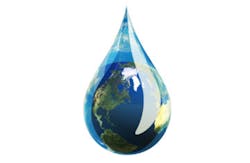USGS study shows affects of process water from oil and gas development
RESTON, Va. — A study by the U.S. Geological Survey (USGS) shows that wastewater treatment plants that process waters from oil and gas development were found to discharge elevated levels of toxic chemicals known as brominated disinfection byproducts, according to a press release.
Disinfection byproducts are created by chemical reactions when water is disinfected. Of the hundreds of known, or suspected, disinfection byproducts possibly created by disinfection processes, the brominated forms are among the most toxic, stated the release.
"While these findings do not indicate an immediate threat to aquatic life or human health, the study provides new data on the water quality of streams receiving discharged wastewater that can be used to inform decisions about management and treatment of produced waters," said Michelle Hladik, primary author of the report.
Waters that are co-produced when oil and gas resources are extracted from deep geological formations are commonly called produced waters. Produced waters are composed of naturally occurring materials characteristic of the geologic formations in which they originate, noted the release.
Often, the water in these formations is a brine with high concentrations of bromide, iodide, and other ions such as sodium and chloride.
Read the entire press release here.
